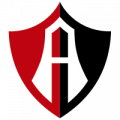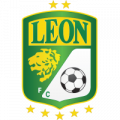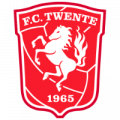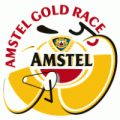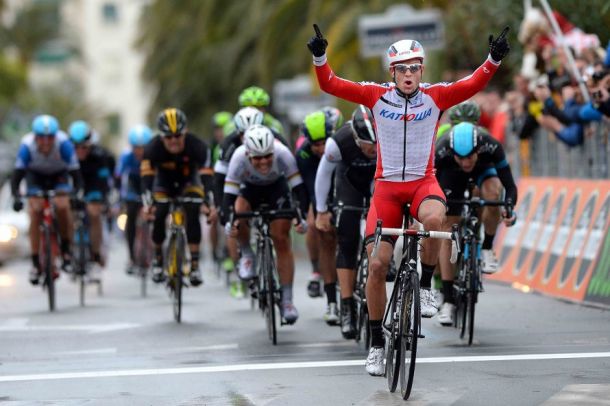Stage Fifteen: Tallard – Nîmes 222km
The race moves west towards the Pyrenees with a bunch sprint the most likely outcome. The stage does run roughly parallel to the coast so crosswinds could well be a factor, in which case the GC contenders will have to be attentive; no one will want to lose time in the wind as Alejandro Valverde did in 2013. Once again there are a number of roundabouts to negotiate in the run-in but the final kilometre is just a fairly straight run to the line, ideal for the big sprint trains if a large peloton arrives at the finish en-masse.
Rider to Watch: Alexander Kristoff – Katusha Team
Alexander Kristoff is a powerful rider with a fast finish but he isn’t a pure sprinter; he climbs well for someone with such a strong build, and is at his best when the racing is exceptionally tough. Kritoff proved that by claiming victory in Milan-San Remo in March. The first Monument of the year, Milan-San Remo is long at 294km and the weather conditions were poor, as a result the peloton had been reduced to less than 30 riders by the time they reached the finish. After strong support riding by Luca Paolini Kristoff was patient before carefully picking the right moment to open up his sprint and claim victory with aplomb.
Kristoff’s excellent speed after such a difficult day in the saddle was the key to victory, he wasn’t the only fast finisher in that final group, but he was the only one with real speed in the legs at that stage of the race, a fact Kristoff acknowledged in a Katusha press release: “A sprint after 300 km is different from one after 200 km. Normally I don’t lose much power even on a long stage. I saw Cavendish, who started his sprint, so I started mine, too. For the last 150 meters I had super power and was able to hold the others off. I was super happy when I saw I’d taken the win. It was the best moment in my life. Right now I’m enjoying this moment and I’m super happy. It’s the highlight of my career“.
Kristoff finished second on the opening stage in Corsica in last year’s Tour de France, and recorded a total of six top 6 finishes without support. After such a strong debut it was only natural that the Katusha team opted to include Kristoff again this year, this time accompanied by some support. If he can place well on the conventional sprint stages, Kristoff possesses the stamina and climbs well enough to outlast the pure sprinters on other stages; the Green Jersey may be within reach. The powerful Norwegian will struggle to displace all three elite sprinters on the more straightforward sprint stages, but if the winds are strong then stage fifteen will be long enough, bumpy enough and tough enough to bring Kristoff to the fore.
Stage Sixteen: Carcassonne – Bagnères-de-Luchon 237.5km
After the final rest day the peloton must tackle the longest stage of the race as they reach the Pyrenees. The stage gets increasingly difficult as it progresses, culminating with the 11.7km, 7.7% Port de Balès, which has ramps of up to 11%. They crest the Port de Balès with 21.5km to go and all bar the final 2km is part of the descent. Any riders who lead over the top of the climb have a great chance to take the stage victory and an aggressive descender could well attack the favourites on the run to the line.
Rider to Watch: Michal Kwiatkowski – Omega Pharma-Quick Step
Michal Kwiatkowski is a phenomenally gifted cyclist; the 24 year old Polish all-rounder has the ability to win in any race he enters. He enjoyed a breakout year in 2013 when he finished 4th overall in Tirreno-Adriatico, 4th and 5th respectively in the Amstel Gold Race and La Fleche Wallonne, and 11th overall on his debut at the Tour de France.
Kwiatkowski has taken a step forward in 2014; his time trial prowess delivered victory in the Volta ao Algarve and helped him to 2nd overall at the Vuelta Ciclista al Pais Vasco. He claimed a memorable victory ahead of Peter Sagan in the one-day classic Strade Bianche, Kwiatkowski exploded away from Sagan on the short steep ramp inside the final kilometre of the race. He returned to the Ardennes to finish 3rd in both La Fleche Wallonne and Liege-Bastogne-Liege. However Kwiatowski’s form has slipped precipitously since then, fading badly after winning the prologue at the Tour de Romandie, and being far from his best at the Criterium du Dauphine.
If Kwiatkowski has a weakness it is his ability to hold up on the longer climbs and arduous mountain days, that should improve with age but for it combines with the loss of form to raise serious doubts about Kwiatkowski’s ability to ride for the GC in this Tour de France. If he struggles to stay close to the favourites on the mountainous stages ten, thirteen and fourteen, then he should switch his sights to chasing stage wins, and this one would be perfect for him.
The winner of stage sixteen will likely be a strong climber and excellent descender, who successfully escapes in the early breakaway. French favourite Thomas Voeckler (Team Europcar) did just that to win on this finish in the past, while Colombian Janier Acevedo (Garmin-Sharp) can drop from a mountain like a stone; if he has a lead at the top of the climb there will be no catching him on the descent. Kwiatkowski possesses the requisite climbing and descending skills for this stage, and also has the finishing speed to be able to sprint to victory if a small group arrives at the finish together.



















